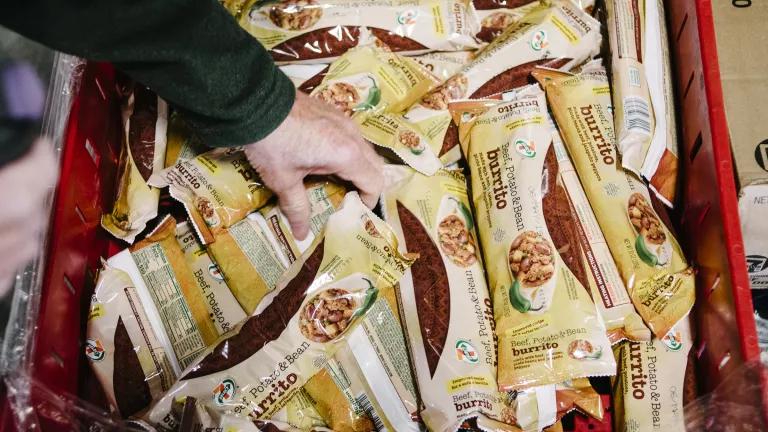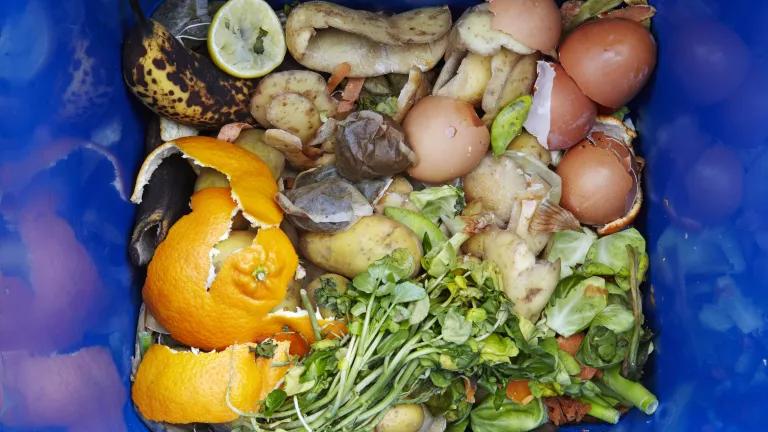Congress Says: No Time to Waste!
A new bipartisan, bicameral bill offers an opportunity for Congress to make meaningful progress towards our national goal of cutting food waste in half.

A crate full of pre-packaged beef, potato and bean burritos donated by 7-11 await redistribution at the We Don’t Waste warehouse in Denver, Colorado, on May 2, 2019. We Don’t Waste is one of the largest food recovery organizations in Colorado.
Matt Nager for NRDC
This blog was co-authored with Tori Oto and Noam Haykeen from the Harvard Law School Food Law & Policy Clinic
Up to 40% of all food in our country ends up in the landfill or incinerator, and when that happens, we waste all of the energy, labor, and water that went into growing, processing, transporting, and preparing that food. Greenhouse gas emissions are generated at every step of the food chain, so reducing wasted food can bring many environmental, social, and economic benefits. The U.S. has a national goal to cut food waste in half by 2030. With just over six years to go, we need the federal government to step up to provide the funding and regulatory environment to support waste reduction. The bipartisan New Opportunities for Technological Innovation, Mitigation, and Education To Overcome Waste Act (NO TIME TO Waste Act) offers an opportunity for Congress to make meaningful progress towards achieving this goal.
The NO TIME TO Waste Act was introduced by Senators Chris Coons (D-DE) and Jerry Moran (R-KS), along with Representatives Chellie Pingree (D-ME) and Mike Lawler (R-NY). It draws on several of the recommendations made by the Zero Food Waste Coalition in our Opportunities to Reduce Food Waste in the 2023 Farm Bill report. The bill aims to:
- Strengthen coordination on food waste: Several agencies, including U.S. Department of Agriculture (USDA), U.S. Environmental Protection Agency (EPA), and Food and Drug Administration (FDA), are already working on food loss and waste reduction but lack adequate support and resources. The NO TIME TO Waste Act would create an Office of Food Loss and Waste at USDA to supplement the role of the Food Loss and Waste Liaison position, which was established as part of the 2018 Farm Bill, and formalize interagency collaboration to better coordinate this work across agencies.
- Foster an environment for food loss and waste prevention: The bill strengthens funding programs, procurement, and research. The bill extends eligibility to states for the Community Compost and Food Waste Reduction Program, a successful grant program that has reduced food waste at the local level. It also supports public-private partnerships, makes more money available to support food rescue operations, and creates a new staff role at USDA called "regional coordinators" to support food rescue work. On federal procurement, the bill will require the federal government to work with contractors that measure and prevent food waste, recycle food scraps, and donate surplus food. The bill also directs current USDA research programs to include food loss and waste as part of their priorities, which will help underscore an integrated comprehensive approach throughout the agency.
- Increase education on food loss and waste: The NO TIME TO Waste Act would initiate a national food loss and waste public awareness campaign focused on developing educational materials that communicate the extent to which food goes to waste in households, methods for preserving and storing foods, tips for identifying whether food is still safe to eat, etc. This would build upon existing educational efforts across the country.
The NO TIME TO Waste Act would provide many social, environmental, and climate benefits such as helping more food get to people experiencing food insecurity, supporting new work to keep food out of landfills and incinerators across the country, and increasing much needed research on drivers of and interventions for wasted food. With 2030 approaching, big steps are needed to achieve our national goals. The bill’s title is on point: there is truly no time to waste.




